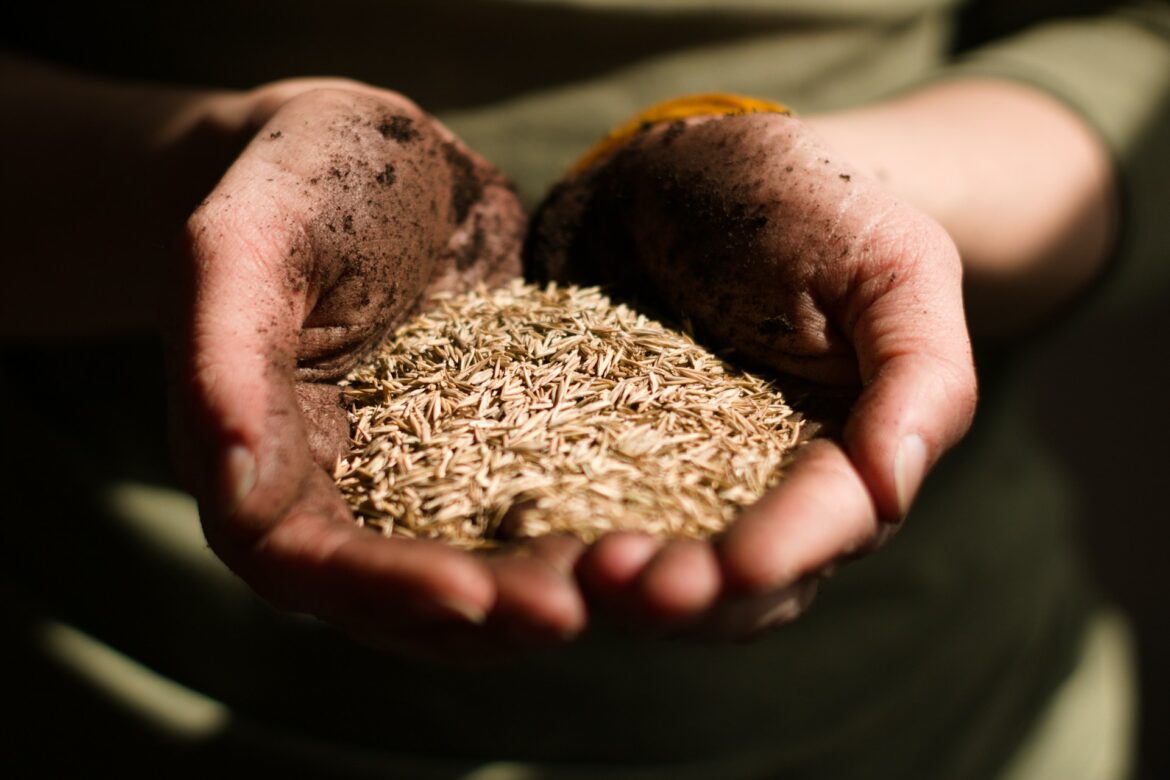Mark 4:3-8 (NLT)
3 “Listen! A farmer went out to plant some seed.
4 As he scattered it across his field, some of the seed fell on a footpath, and the birds came and ate it.
5 Other seed fell on shallow soil with underlying rock. The seed sprouted quickly because the soil was shallow.
6 But the plant soon wilted under the hot sun, and since it didn’t have deep roots, it died.
7 Other seed fell among thorns that grew up and choked out the tender plants so they produced no grain.
8 Still other seeds fell on fertile soil, and they sprouted, grew, and produced a crop that was thirty, sixty, and even a hundred times as much as had been planted!”
Mark 4:14-20 (KJV)
14 The sower soweth the word.
15 And these are they by the way side, where the word is sown; but when they have heard, Satan cometh immediately, and taketh away the word that was sown in their hearts.
16 And these are they likewise which are sown on stony ground; who, when they have heard the word, immediately receive it with gladness;
17 And have no root in themselves, and so endure but for a time: afterward, when affliction or persecution ariseth for the word’s sake, immediately they are offended.
18 And these are they which are sown among thorns; such as hear the word,
19 And the cares of this world, and the deceitfulness of riches, and the lusts of other things entering in, choke the word, and it becometh unfruitful.
20 And these are they which are sown on good ground; such as hear the word, and receive it, and bring forth fruit, some thirtyfold, some sixty, and some an hundred.
The Seed and the Sower — A Kingdom Principle
Every harvest begins with a seed. Each seed carries the potential for abundant fruit, but its success depends on the soil where it lands. Some seeds sprout quickly; others take time, and some never grow at all. Conditions matter.
Jesus told the Parable of the Sower (also called the Parable of the Four Soils) to illustrate how God’s Word is received in the human heart. The Gospel—the seed—is the same for all, yet its fruitfulness depends on the condition of the soil—the heart.
Jesus often taught in parables, using earthly examples to reveal heavenly truths (Matthew 13:10-17). Through this parable, Jesus teaches us that spiritual growth and fruitfulness are tied to how we hear, receive, and respond to God’s Word.
Let us consider the four types of soil—or heart conditions—and how they reflect our response to God’s Word. This is an opportunity for self-examination and spiritual growth as we seek to be good soil that bears much fruit.
-
The Seeds by the Wayside (Hard Soil)
Mark 4:4 (KJV):
“And it came to pass, as he sowed, some fell by the way side, and the fowls of the air came and devoured it up.”
The “wayside” represents a hardened, unreceptive heart. The seed, which is the Word of God, cannot penetrate, and the enemy snatches it away before it takes root.
Examples of Hard Hearts in Scripture:
- Pharisees and Sadducees (Mark 3:5): Resisted truth despite miracles.
- Pharaoh (Exodus 7-14): Repeatedly rejected God’s command despite signs and plagues.
- King Saul (1 Samuel 15:1-23): His disobedience and refusal to repent revealed the hardness of his heart.
Hard hearts are common today—hardened by sin, pride, or distraction. Many hear the gospel but do not receive it. Sometimes the Word seems to “bounce off” because bitterness, unbelief, or rejection blocks its entrance. I remember inviting relatives to a Bible study. They listened but later admitted they did not understand.
LIFE REFLECTION
Hearing God’s Word does not guarantee understanding or acceptance. Satan is always ready to steal the seed from our hearts (Luke 8:12).
Guarding Against a Hard Heart:
Mark 4:24-25 (NLT) reminds us:
“Pay close attention to what you hear. The closer you listen, the more understanding you will be given… But for those who are not listening, even what little understanding they have will be taken away.”
Let us commit to active listening and seeking God’s revelation in His Word. Pray for God to soften your heart, open your eyes and ears, and guard your understanding from the enemy’s attacks.
-
The Seeds on Rocky Ground (Shallow Soil)
Mark 4:5-6 (KJV):
“And some fell on stony ground, where it had not much earth; and immediately it sprang up, because it had no depth of earth: But when the sun was up, it was scorched; and because it had no root, it withered away.”
This soil represents shallow faith. The seed sprouts quickly with enthusiasm but lacks roots. When pressure or persecution comes, faith withers.
Examples of Shallow Faith:
- Disciples in the storm (Mark 4:35-41): Panicked and questioned Jesus’ care despite His presence with them.
- Israelites in the wilderness (Numbers 14:1-4): Repeatedly doubted God’s promise and rebelled against Moses.
- Ananias and Sapphira (Acts 5:1-11): Lacked genuine faith and integrity.
Many people have shallow faith. They eagerly accept the gospel but lack the depth of spiritual roots to endure trials. When sickness, family problems, financial difficulties, or persecution arise, they fall away or become offended.
Some are “seasonal Christians”—attending church and serving God in “good weather” but disappear during “storms.” When life gets difficult, excuses arise: “I’m too busy.” “God is still in my heart.” “I just need a break.”
Growing Deeper Roots:
Hebrews 12:2 (KJV) directs us:
“Looking unto Jesus the author and finisher of our faith.”
To withstand trials, faith must be rooted in Christ, not circumstances. Deep roots develop through constant prayer, Bible study, fellowship, and trust in God’s timing.
LIFE REFLECTION
Is my faith rooted deeply in Christ, or shallow?
Do I cling to God during trials or drift away?
What spiritual habits can I develop to help me grow stronger roots?
-
The Seeds Among Thorns (Crowded Soil)
Mark 4:7 (KJV):
“And some fell among thorns, and the thorns grew up, and choked it, and it yielded no fruit.”
Here, the seed begins to grow, but the cares of this world, deceitfulness of riches, and lusts choke the plant, preventing fruitfulness.
Examples of Thorny Soil:
- The Rich Young Ruler (Mark 10:17-22): Could not surrender his wealth to follow Jesus.
- Demas (2 Timothy 4:10): Abandoned Paul for worldly pleasures.
- Solomon (1 Kings 11:1-13): Allowed worldly desires to draw him into idolatry.
The cares of life can be overwhelming. Work, family, finances, entertainment, social media, and other distractions can all choke spiritual growth. It is easy to prioritize worldly concerns over spiritual disciplines. For example, choosing work over church or ministry opportunities, stressing over bills while neglecting prayer and Bible reading.
Guarding Against Thorns:
- Hebrews 2:1 (NIV): “We must pay the most careful attention, therefore, to what we have heard, so that we do not drift away.”
- Proverbs 4:23 (NASB): “Watch over your heart with all diligence, for from it flow the springs of life.”
We must vigilantly guard against anything that comes before God in our lives—materialism, busyness, selfish ambitions. Surround yourself with godly influences and remain focused on God’s kingdom.
LIFE REFLECTION
What “thorns” are choking my spiritual growth?
How can I prioritize God above worldly cares?
Am I allowing distractions to steal my time with God?
-
The Seeds on Good Soil
Mark 4:8 (KJV):
“And other fell on good ground, and did yield fruit that sprang up and increased; and brought forth, some thirty, and some sixty, and some an hundred.”
Good soil represents a receptive heart—one that hears, accepts, and obeys God’s Word. It is a heart prepared by grace, cultivated by faith, and fruitful in God’s kingdom.
Examples of Good Soil:
- Jairus (Mark 5:21-43): Trusted Jesus to heal his daughter.
- The Woman with the Issue of Blood (Mark 5:21-43): Courageously reached out in faith and was healed.
- The Syrophoenician Woman (Mark 7:24-30): Persisted in faith for her daughter’s healing.
Characteristics of Good Soil:
- Receptive—Ready to hear and accept God’s Word.
- Rooted—Faith grows deep through prayer, study, and fellowship.
- Resilient—Stands firm in trials and temptations.
- Fruitful—Produces spiritual fruit such as love, joy, peace, and reaching others for Christ.
Psalm 1:3 (KJV):
“He shall be like a tree planted by the rivers of water, that bringeth forth his fruit in his season; his leaf also shall not wither; and whatsoever he doeth shall prosper.”
Colossians 2:6-7 (NLT):
“Let your roots grow down into him, and let your lives be built on him. Then your faith will grow strong in the truth you were taught, and you will overflow with thankfulness.”
The Call to Fruitfulness:
Fruitfulness is not optional—it is the evidence of true discipleship (John 15:5-8). A fruitful life glorifies God and impacts others.
LIFE REFLECTION
Am I scattering seeds? Sharing my testimony? Inviting others to Christ? Being a living witness of God’s love?
Where Are You Planted?
Jesus is the Farmer who scatters the seed—the Word of God. Each of us is soil. The question is: What kind of soil am I?
- Are you by the wayside, hardened?
- On rocky ground, shallow?
- Among thorns, distracted?
- Or on good soil, bearing lasting, abundant fruit?
Let us examine our hearts daily, pray for God’s grace, and seek to be good soil that produces a bountiful harvest for His kingdom.



